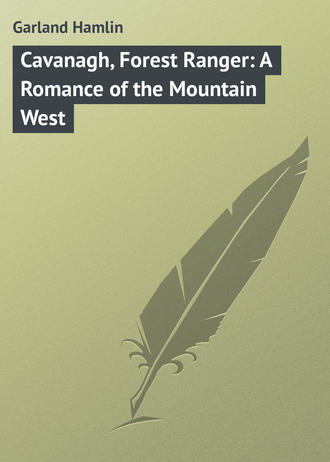 полная версия
полная версияCavanagh, Forest Ranger: A Romance of the Mountain West
Springing out unaided, Lee hurried in, hoping to prepare her mother for the shock of the little physician’s unimposing appearance, while Redfield remained behind to arm the physician for his encounter. “Now, Doctor, Mrs. Wetherford is a very singular and plain-spoken person. She’s quite likely to swear like a man, but she will perform like a woman. Don’t mind what she says; go ahead in your own way. Will you wait till after dinner, or shall I – ”
“No, I shall make the examination first – while I’m hungry. My mind works quicker. I can’t diagnose properly on a full stomach.”
“Very well; line up with me, and together we’ll beard the old grizzly in her den.”
They found Lize on duty behind the counter as usual. Her face was dejected, her eyes dull, but as she caught sight of the strange little man, she cried out: “Lord God, Reddy, why didn’t you bring me a man?”
“Hush, mother,” cautioned Lee, “this is the famous Eastern physician.”
“You can’t be famous for your beauty – you must be brainy,” she remarked to herself in the stranger’s hearing.
Redfield presented “Doctor Fessenden, of Omaha.”
She started again on contemptuous ways, but was stopped by the little man. “Get down out o’ that chair!” he commanded. “My time is money!”
Lize flushed with surprise and anger, but obeyed, and Lee Virginia, secretly delighted with the physician’s imperative manner, led the way into the lodging-house. “I’ll look after the cash, mother,” she said. “Don’t worry.”
“I’m not worryin’,” she replied; “but what does that little whelp mean by talking to me like that? I’ll swat him one if he isn’t careful!”
“It’s his way. Please don’t anger him. You need his help.”
The doctor interfered. “Now, madam, strip, and let’s see what’s the matter with you,” whereupon he laid off his coat, and opened his box of instruments.
Lee fled, and Redfield, who had remained standing beside the counter, could not repress a smile. “She’s caught a tartar this time. He’s a little tiger, isn’t he? I had prepared him for war, but I didn’t expect him to fly at her that way.”
“Poor mother! how dreadfully ill she looks to-day. I hope the doctor will order her to rest.”
“But will she obey? I’ve argued that with her. She keeps saying she will, but she won’t.”
It was nearly one, but the customers were coming in, and the girl, laying aside her hat and veil, took her seat at the cash-register, while Redfield went out to put his machine in order for the return trip. She realized that she was now at close-hand grapple with life. For the most part she had been able, up to this time, to keep in the background, and to avoid the eyes of the rough men who came and went before her mother’s seat. But now she was not merely exposed to their bold glances; she was in a position where each man could make excuse to stop and demand a word what time his change was being counted.
Her glowing cheeks, her pretty dress, made her a shining mark, and the men began at once to improve their opportunity by asking, “Where’s Lize?” And this embarrassed her, for the reason that she did not care to go into the cause of her mother’s temporary absence, and, perceiving her confusion, one of them passed to coarse compliment. “There’s nothing the matter with you,” he said, with a leer. Others, though coarse, were kindly in their familiarity, and Sifton, with gentle face, remained to help her bear the jests of the more uncouth and indelicate of her admirers.
Perceiving her nervousness, Neill Ballard raised loud outcry over a mistake she made in returning change, and this so confused and angered her that her eyes misted with tears, and she blundered sadly with the next customer. His delight in her discomfiture, his words, his grin became unendurable, and in a flush of rage and despair she sprang to her feet and left them to make triumphant exit. “I got her rattled!” he roared, as he went out. “She’ll remember me.”
The diners were all smiling, and Gregg took a malicious satisfaction in her defeat. She had held herself haughtily apart from him, and he was glad to see her humbled.
Leaving her place behind the counter, she walked through the room with uplifted head and burning eyes, her heart filled with bitterness and fire. She hated the whole town, the whole State, at the moment. Were these “the chivalrous short-grass knights” she had heard so much about? These the large-souled “Western founders of empire”? At the moment she was in the belief that all the heroes of her childhood had been of the stamp of Neill Ballard – selfish, lustful, and cruel.
In the hall her pride, her sense of duty, came back to her, and she halted her fleeing feet. “I will not be beaten!” she declared, and her lips straightened. “I will not let these dreadful creatures make a fool of me in that way!”
Thereupon she turned and went back, pale now, but resolved to prove herself the mistress of the situation. Fortunately Redfield had returned, and his serene presence helped her to recover complete control of herself. She remained coldly blank to every compliment, and by this means she subdued them. “Why doesn’t the doctor return for his dinner?” she asked, after the room had cleared. The desire to know her mother’s real condition at last quite subordinated her own besetments. To some of the older men whom she knew to be neighbors and friends she gladly explained the situation, and their sympathy did something to restore her faith in humankind. Nevertheless, this hour of unprotected intercourse with the citizens of the town was disturbing, humiliating, and embittering.
The doctor appearing suddenly in the door beckoned to her, and, leaving her place, she crossed to where he stood. “Your mother needs you,” he said, curtly. “Go to her, and keep her quiet for an hour or two if you can.”
“What is the matter, doctor?”
“I can’t tell you precisely, but you must get her on a diet and keep her there. I will write out some lists for you after my luncheon.”
Lee found her mother sitting in such dejection as she had never known her to display, though she fired up sufficiently to say: “That cussed little thimble-rigger has been throwing a great big scare into me. He says I’ve got to get out-doors, live on raw meat and weak tea, and walk five miles a day. That’s what he says!” she added, in renewed astonishment at the man’s audacity. “Who’s at the cash?”
“Mr. Redfield,” replied Lee. “I’ll go right back.”
“No you won’t, I’m no dead horse yet.” She struggled to her feet and started for the cash-register. “I won’t let no little Omaha doughgie like that put me out o’ business.”
Despite all warnings, she walked out into the dining-room and took her accustomed seat with set and stern face, while her daughter went to the table where the doctor sat, and explained her inability to manage her mother.
“That’s your problem,” he replied, coolly. Then rapidly, succinctly, and clearly he went over the case, and laid out a course of treatment. Out of it all Lee deduced that her mother was very ill indeed, though not in danger of sudden death.
“She’s on the chute,” said Fessenden, “and everything depends upon her own action whether she takes the plunge this winter or twenty years from now. She’s a strong woman – or has been – but she has presumed upon her strength. She used to live out-of-doors, she tells me, during all her early life, and now, shut in by these walls, working sixteen hours a day, she is killing herself. Get her out if you can, and cut out stimulants.”
As he rose and approached the counter, Lize shoved a couple of gold pieces across the board. “That wipes you off my map,” she grimly declared. “I hope you enjoyed your ride.”
“It’s up to you, madam,” he replied, pocketing the gold. “Good-day!”
Lee followed him out to the car, eager to secure all she could of his wisdom. He repeated his instructions. “Medicine can’t help her much,” he said, “but diet can do a great deal. Get her out of that rut she’s in. Good-bye.”
“I’ll be down again in a day or two!” called Redfield.
The machine began to purr and spit and the wheels to spin, and Lee Virginia was left to face her mother’s obstinate resistance alone. She felt suddenly very desolate, very weak, and very poor. “What if mother should die?” she asked herself.
Gregg was standing before the counter talking with Lize as Lee returned, and he said, with a broad smile: “I’ve just been saying I’d take this hotel off your mother’s hands provided you went with it.”
In the mouths of some men these words would have been harmless enough, but coming from the tongue of one whose life could only be obscurely hinted at the jest was an insult. The girl shuddered with repulsion, and Lize spoke out:
“Now see here, Bullfrog, I’m dead on the hoof and all that, but neither you nor any other citizen like you can be funny with my girl. She’s not for you. Now that’s final! She ain’t your kind.”
Gregg’s smile died into a gray, set smirk, and his eyes took on a steely glint. He knew when the naked, unadorned truth was spoken to him. Words came slowly to his lips, but he said: “You’ll be glad to come to me for help some day – both of you.”
“Oh, get along! You don’t hold no mortgage on me,” retorted Lize, contemptuously, and turned to Lee. “I’m hungry. Where’s that grub chart o’ mine?”
Lee brought the doctor’s page of notes and read it through, while her mother snorted at intervals: “Hah! dry toast, weak tea, no coffee, no alcohol. Huh! I might as well starve! Eggs – fish – milk! Why didn’t he say boiled live lobsters and champagne? I tell you right now, I’m not going to go into that kind of a game. If I die I’m going to die eating what I blame please.”
The struggle had begun. With desperate courage Lee fought, standing squarely in the rut of her mother’s daily habit. “You must not hive up here any longer,” she insisted; “you must get out and walk and ride. I can take care of the house – at least, till we can sell it.”
It was like breaking the pride of an athlete, but little by little she forced upon her mother a realization of her true condition, and at last Lize consented to offer the business for sale. Then she wept (for the first time in years), and the sight moved her daughter much as the sobs of a strong man would have done.
She longed for the presence of Ross Cavanagh at this moment, when all her little world seemed tumbling into ruin; and almost in answer to her wordless prayer came a messenger from the little telephone office: “Some one wants to talk to you.”
She answered this call hurriedly, thinking at first that it must be Mrs. Redfield. The booth was in the little sitting-room of a private cottage, and the mistress of the place, a shrewd little woman with inquisitive eyes, said: “Sounds to me like Ross Cavanagh’s voice.”
Lee was thankful for the booth’s privacy, for her cheeks flamed up at this remark; and when she took up the receiver her heart was beating so loud it seemed as if the person at the other end of the wire must hear it. “Who is it, please?” she asked, with breathless intensity.
A man’s voice came back over the wire so clear, so distinct, so intimate, it seemed as if he were speaking into her ear. “It is I, Ross Cavanagh. I want to ask how your mother is?”
“She is terribly disheartened by what the doctor has said, but she is in no immediate danger.”
He perceived her agitation, and was instantly sympathetic. “Can I be of use – do you need me? If you do, I’ll come down.”
“Where are you?”
“I am at the sawmill – the nearest telephone station.”
“How far away are you?”
“About thirty miles.”
“Oh!” She expressed in this little sound her disappointment, and as it trembled over the wire he spoke quickly: “Please tell me! Do you want me to come down? Never mind the distance – I can ride it in a few hours.”
She was tempted, but bravely said: “No; I’d like to see you, of course, but the doctor said mother was in no danger. You must not come on our account.”
He felt the wonder of the moment’s intercourse over the wilderness steeps, and said so. “You can’t imagine how strangely sweet and civilized your voice sounds to me here in this savage place. It makes me hope that some day you and Mrs. Redfield will come up and visit me in person.”
“I should like to come.”
“Perhaps it would do your mother good to camp for a while. Can’t you persuade her to do so?”
“I’m trying to do that – I mean, to stop work; but she says, ‘What can we do to earn a living?’”
“If nothing happens I hope to spend an hour or two at the Forks next Sunday. I hope to find your mother better.”
Their words were of this unemotional sort, but in their voices something subtler than the electrical current vibrated. He called to her in wordless fashion and she answered in the same mysterious code, and when she said “Good-bye” and hung up the receiver her world went suddenly gray and commonplace, as if a ray of special sunlight had been withdrawn.
The attendant asked, with village bluntness: “It was Ross, wasn’t it?”
Lee Virginia resented this almost as much as if it were the question of an eavesdropper; but she answered: “Yes; he wanted to know how my mother was.”
She turned as she reached the street and looked up toward the glorious purpling deeps from which the ranger’s voice had come, and the thought that he was the sole guardian of those dark forests and shining streams – that his way led among those towering peaks and lone canons – made of him something altogether admirable.
That night her loneliness, her sense of weakness, carried her to bed with tears of despair in her eyes. Lize had insisted on going back to her work looking like one stricken with death, yet so rebellious that her daughter could do nothing with her; and in the nature of fate the day’s business had been greater than ever, so that they had all been forced to work like slaves to feed the flood of custom. And Lize herself still kept her vigil in her chair above her gold.
Closing her mind to the town and all it meant to her, the girl tried to follow, in imagination, the ranger treading his far, high trails. She recalled his voice, so cultivated, so rich of inflection, with dangerous tenderness. It had come down to her from those lofty parapets like that of a friend, laden with something sweeter than sympathy, more alluring than song.
The thought of some time going up to the high country where he dwelt came to her most insistently, and she permitted herself to dream of long days of companionship with him, of riding through sunlit aisles of forest with him, of cooking for him at the cabin – what time her mother grew strong once more – and these dreams bred in her heart a wistful ache, a hungry need which made her pillow a place of mingled ecstasy and pain.
VII
THE POACHERS
One morning, as he topped the rise between the sawmill and his own station, Cavanagh heard two rifle-shots in quick succession snapping across the high peak on his left. Bringing his horse to a stand, he unslung his field-glasses, and slowly and minutely swept the tawny slopes of Sheep Mountain from which the forbidden sounds seemed to come.
“A herder shooting coyotes,” was his first thought; then remembering that there were no camps in that direction, and that a flock of mountain-sheep (which he had been guarding carefully) habitually fed round that grassy peak, his mind changed. “I wonder if those fellows are after those sheep?” he mused, as he angled down the slope. “I reckon it’s up to me to see.”
He was tired and hungry, a huge moraine lay between, and the trail was long and rough. “To catch them in the act is impossible. However,” he reflected, “they have but two trails along which to descend. One of these passes my door, and the other, a very difficult trail, leads down the South Fork. I’ll have time to get breakfast and change horses. They’ll probably wait till night before attempting to go out, anyway.”
In less than three hours he was over on the trail in the canon, quite certain that the hunters were still above him. He rode quietly up the valley, pausing often to listen and to scrutinize the landscape; but no sign of camp-fire and no further rifle-shots came, and at last he went into camp upon the trail, resolved to wait till the poachers appeared, a ward which his experience as a soldier helped him to maintain without nodding.
In these long hours his thought played about the remembrance of his last visit to the Fork and his hour with Lee. He wondered what she was doing at the moment. How charming she had looked there at Redfields’ – so girlish in form, so serious and womanly of face!
He felt as never before the ineludible loneliness of the ranger’s life. Here he sat in the midst of a mighty forest with many hostile minds all about him, and it must be confessed he began to wonder whether his services to the nation were worth so much hardship, such complete isolation. The stream sang of the eternities, and his own short span of life (half gone already without any permanent accomplishment) seemed pitifully ephemeral. The guardians of these high places must forever be solitary. No ranger could rightfully be husband and father, for to bring women and children into these solitudes would be cruel.
He put all this aside – for the time – by remembering that he was a soldier under orders, and that marriage was a long way off, and so smoked his pipe and waited for the dawn, persistent as a Sioux, and as silent as a fox.
At daylight, there being still no sign of his quarry, he saddled his horse, and was about to ride up the trail when he caught the sound of voices and the sharp click of iron hoofs on the rocks above him. With his horse’s bridle on his arm he awaited the approaching horseman, resolute and ready to act.
As the marauders rounded the elbow in the trail, he was surprised to recognize in the leader young Gregg. The other man was a stranger, an older man, with a grizzled beard, and tall and stooping figure.
“Hello Joe,” called the ranger, “you’re astir early!”
The youth’s fat face remained imperturbable, but his eyes betrayed uneasiness. “Yes, it’s a long pull into town.”
“Been hunting?” queried the ranger, still with cheery, polite interest.
“Oh no; just visiting one of my sheep-camps.”
Cavanagh’s voice was a little less suave. “Not on this creek,” he declared. “I moved your herder last week.” He walked forward. “That’s a heavy load for a short trip to a sheep-camp.” He put his hand on the pack. “I guess you’ll have to open this, for I heard two shots yesterday morning up where that flock of mountain-sheep is running, and, furthermore, I can see blood-stains on this saddle-blanket.”
Neither of the men made answer, but the old man turned an inquiring look at his young leader.
The ranger flung his next sentence out like the lash of a whip. “Open this sack or I cut the ropes!”
Gregg threw out a hand in command. “Open it up, Edwards!” he said, sullenly.
With mechanical readiness the guide alighted from his horse, loosened the cinch on the pack-horse, and disclosed the usual camp-bed.
“Put off that bedding!” insisted the ranger.
Off came the outfit, and under the tent lay the noble head of a wild ram – a look of reproach still in his splendid yellow eyes.
Cavanagh’s face hardened. “I thought so. Now heave it back and cinch up. It’s you to the nearest magistrate, which happens to be Higley, of Roaring Fork. I’ll make an example of you fellows.”
There was nothing for Gregg to say and nothing for Edwards to do but obey, for a resolute ranger with an excellent weapon of the latest and most approved angular pattern stood ready to enforce his command; and when the pack was recinched, Cavanagh waved an imperative hand. “I guess I’ll have to take charge of your guns,” he said, and they yielded without a word of protest. “Now march! Take the left-hand trail. I’ll be close behind.”
A couple of hours of silent travel brought them to the ranger’s cabin, and there he ordered a dismount.
As the coffee was boiling he lectured them briefly. “You fellows are not entirely to blame,” he remarked, philosophically. “You’ve been educated to think a game warden a joke and Uncle Sam a long way off. But things have changed a bit. The law of the State has made me game warden, and I’m going to show you how it works. It’s my duty to see that you go down the road – and down you go!”
Edwards, the guide, was plainly very uneasy, and made several attempts to reach Cavanagh’s private ear, and at last succeeded. “I’ve been fooled into this,” he urged. “I was hard up and a stranger in the country, and this young fellow hired me to guide him across the range. I didn’t shoot a thing. I swear I didn’t. If you’ll let me off, I’ll hit the trail to the West and never look back. For God’s sake, don’t take me down the road! Let me off.”
“I can’t do that,” replied Cavanagh; but his tone was kindlier, for he perceived that the old fellow was thin, hollow-chested, and poorly clad. “You knew you were breaking the laws, didn’t you?”
This the culprit admitted. “But I was working for Sam Gregg, and when Joe asked me to go show him the trail, I didn’t expect to get cinched for killing game. I didn’t fire a shot – now that’s the God’s truth.”
“Nevertheless,” retorted Ross, “you were packing the head, and I must count you in the game.”
Edwards fell silent then, but something in his look deepened the ranger’s pity. His eyes were large and dark, and his face so emaciated that he seemed fit only for a sanitarium.
The trip to the Fork (timed to the gait of a lazy pack-horse) was a tedious eight hours’ march, and it was nearly seven o’clock when they arrived at the outskirts of the village. There had been very few words spoken by Cavanagh, and those which the prisoners uttered were not calculated to cheer the way. Joe blamed his guide for their mishap. “You should have known how far the sound of our guns would carry,” he said.
As they were nearing the village he called out: “See here, Cavanagh, there’s no use taking me through town under arrest. I’ll cough up all we got right now. How much is the damage?”
“I can’t receive your fine,” replied Ross, “and, besides, you took your chances when you shot that sheep. You lost out, and I’m not going to let you off. This poaching must stop. You go right along with your guide.”
Again Edwards drew near, and pled in a low voice: “See here, Mr. Ranger, I have special reasons why I don’t want to go into this town under arrest. I wish you’d let me explain.”
There was deep emotion in his voice, but Ross was firm. “I’m sorry for you,” he said, “but my duty requires me to take you before a magistrate – ”
“But you don’t know my case,” he replied, with bitter intensity. “I’m out ‘on parole.’ I can’t afford to be arrested in this way. Don’t you see?”
Ross looked at him closely. “Are you telling me the truth?”
“Would you have mercy on me if I were?”
“I should be sorry for you, but I couldn’t let you go.”
“You won’t believe me, but it’s the God Almighty’s truth: I didn’t know Joe intended to kill that sheep. He asked me to show him over the pass. I had no intention of killing anything. I wish to God you would let me go!” His voice was tense with pleading.
“How about this, Gregg?” called Ross. “Your guide insists he had no hand in killing the ram?”
“He fired first, and I fired and finished him,” retorted Gregg.
“’Twas the other way,” declared Edwards. “The beast was crippled and escaping – I killed him with my revolver. I didn’t want to see him go off and die – ”
“I guess that settles it,” said Cavanagh, decisively. “You take your medicine with Joe. If the justice wants to let you off easy, I can’t help it, but to turn you loose now would mean disloyalty to the service. Climb back into your saddle.”
Edwards turned away with shaking hands and unsteady step. “All right,” he said, “I’ll meet it.” He came back to say: “There’s no need of your saying anything about what I’ve told you.”
“No, you are a stranger to me. I know nothing of your life except that I found you with Joe, with this pack on your horse.”
“Much obliged,” said he, with a touch of bitter humor.
To the casual observer in a town of this character there was nothing specially noticeable in three horsemen driving a pack-horse, but to those whose eyes were keen the true relationship of the ranger to his captives was instantly apparent, and when they alighted at Judge Higley’s office a bunch of eager observers quickly collected.









